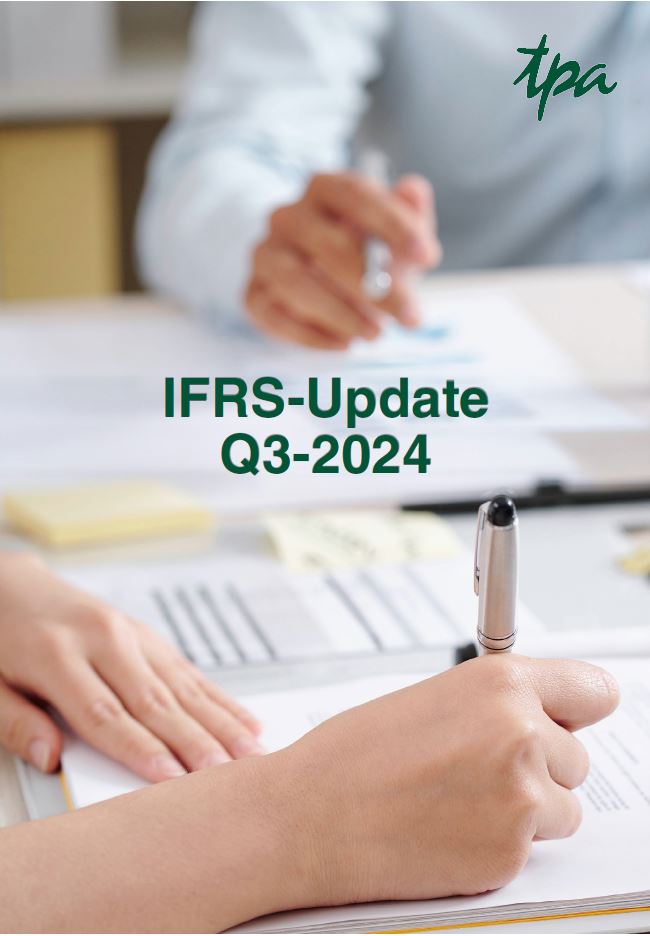News
15. October 2024
Reading Time: 8
Min.
news
IFRS-Update Q3-2024
Below you will find an overview of the status of developments in new and amended standards, interpretations, and other statements within international and Austrian accounting regulation. As of 30 September 2024, we have prepared updates from the European Financial Reporting and Accounting Group (EFRAG), the International Accounting Standards Board (IASB), and the Austrian Financial Reporting Advisory Committee (AFRAC), so that you are informed about which updates are to be applied for the first time in 2024 and which updates will be coming your way in the near future.
On the TPA Website you will find various articles in German language containing detailed information on the new and amended standards.
Table of Contents
EFRAG-Endorsement-Status
EFRAG is the body of the European Union responsible for the adoption of IFRS accounting standards into European law. EFRAG regularly publishes the Endorsement Status, which indicates which standards issued by the IASB have been adopted into European Law. You can view the current Endorsement Status on the EFRAG website.
Standards to be applied for the first time in 2024
For financial years beginning on or after 1 January 2024, entities must apply the following amended standards for the first time:
| First-time application of standards in 2024 | |||
| Issued IASB | Endorse-ment EU | Application | |
| Amendments to IAS 7 Statement of Cash Flows and IFRS 7 Financial Instruments: Disclosures: Supplier Finance Arrangements | 25.05.2023 | 15.04.2024 | 01.01.2024 |
| Amendments to IAS 1 Presentation of Financial Statements: Classification of Liabilities as Current or Non-current as well as Non-current Liabilities with Covenants | 23.01.2020 15.07.2020 31.10.2022 | 19.12.2023 | 01.01.2024 |
| Amendments to IFRS 16 Leases: Lease Liability in a Sale and Leaseback | 22.09.2022 | 20.11.2023 | 01.01.2024 |
Standards to be applied in the future
Companies must apply the following new and amended standards in future periods, provided they are adopted by the European Union (Endorsement Status as of 11 October 2024):
| Standards applicable in the future | |||
| Issued IASB | Endorse-ment EU | Application | |
| IFRS 19 Subsidiaries without Public Accountability: Disclosures | 09.05.2024 | pending | 01.01.2027 |
| IFRS 18 Presentation and Disclosure in Financial Statements | 09.04.2024 | pending | 01.01.2027 |
| Annual Improvements to IFRS Accounting Standards – Volume 11 | 18.07.2024 | pending | 01.01.2026 |
| Amendments to the Classification and Measurement of Financial Instruments (Amendments to IFRS 9 and IFRS 7) | 30.05.2024 | pending | 01.01.2026 |
| Amendments to IAS 21 The Effects of Changes in Foreign Exchange Rates: Lack of Exchangeability | 15.08.2023 | pending | 01.01.2025 |
For further information on IFRS 18 please see our web article IFRS 18 Presentation and Disclosure in Financial Statements.
The Annual Improvements to IFRS Accounting Standards – Volume 11 contain minor changes to accounting standards that have arisen due to inconsistencies and have been resolved by inserting references or deleting words.
The amendments to IAS 21 provide guidance on assessing when a currency is not exchangeable into another currency, how an exchange rate should be determined in such situations, and what information should be disclosed when a currency is not exchangeable.
IASB work plan
The IASB is the issuer of the International Financial Reporting Standards (IFRS). The IASB regularly adopts new or amended standards. To this end, the IASB has created an extensive work plan, which is established every five years with the help of a survey among stakeholders (Agenda Consultation) and is continuously supplemented based on requests.
The IASB work plan is divided into the projects of standard-setting, maintenance, application issues, research, and taxonomy. We have prepared a summary of all projects as of 29 October 2024 for you. You can view the current IASB work plan on the IFRS Foundation website here.
Standard-setting projects
After completing a research project, the IASB can initiate a standard-setting project, which means developing a new standard, such as for example IFRS 18 Presentation and Disclosure in Financial Statements. Narrow-scope amendments to existing standards can also be made.
The standard-setting projects are as follows (as of 29 October 2024):
| Standard-setting project | Next milestone | Expected date | Related Standards |
| Business Combinations – Disclosures, Goodwill and Impairment | Exposure Draft Feedback | December 2024 | IFRS 3 IAS 36 |
| Second Comprehensive Review of the IFRS for SMEs Accounting Standard | IFRS for SMEs Accounting Standard | Q1 2025 | IFRS for SMEs |
| Equity Method | Exposure Draft Feedback | Q2 2025 | IAS 28 |
| Dynamic Risk Management | Exposure Draft | H1 2025 | IFRS 9 |
| Management Commentary | Final Revised Practice Statement | H1 2025 | Practice Statement 1 |
| Rate-regulated Activities | IFRS Accounting Standard | H2 2025 | IFRS 14 |
| Financial Instruments with Characteristics of Equity | Final Amendments | 2026 | Conceptual Framework IAS 32 IFRS 9 |
On 19 September 2024, the IASB published an exposure draft on Accounting for Investments in Associates and Joint Ventures using the Equity Method. The aim is to address several application issues with the existing regulations. Comments on the exposure draft will be accepted until 20 January 2025. We will inform you about this in a future edition of our IFRS Update.
Maintenance projects
Maintenance projects relate to narrowly defined application issues concerning IFRS accounting standards. As a result, the IASB usually develops clarifications on specific issues. A typical example of a maintenance project are the Annual Improvements to the IFRS Accounting Standards, which involve a series of minor changes to existing standards.
The maintenance projects are as follows (as of 29 October 2024):
| Maintenance project | Next milestone | Expected date | Related Standards |
| Provisions – Targeted Improvements | Exposure Draft | November 2024 | Conceptual Framework IAS 37 IFRIC 21 |
| Power Purchase Agreements | Final Standard | December 2024 | IFRS 9 IFRS 7 |
| Addendum to the Exposure Draft Third edition of the IFRS for SMEs Accounting Standard | IFRS for SMEs Accounting Standard | Q1 2025 | IFRS for SMEs |
| Climate-related and Other Uncertainties in the Financial Statements | Exposure Draft Feedback | Q1 2025 | Conceptual Framework IAS 1, IAS 36 IAS 37, IFRS 9 |
| Updating IFRS 19 Subsidiaries without Public Accountability: Disclosures | Exposure Draft Feedback | Q1 2025 | IFRS 19 |
| Translation to a Hyperinflationary Presentation Currency (IAS 21) | Exposure Draft Feedback | Q1 2025 | IAS 21 |
On 18 July 2024, the IASB completed the Annual Improvements to IFRS Accounting Standards – Volume 11 and published the corresponding amendments to various standards (see above, EFRAG Endorsement Status, standards to be applied in the future). The first-time application of the Annual Improvements is on 1 January 2026.
Application questions
The IFRS Interpretations Committee (IFRS IC or the Committee) addresses questions from stakeholders regarding the application of IFRS. If standard setting is necessary, the Committee recommends adding a maintenance project to the work plan. Otherwise, the Committee publishes an agenda decision in which it explains why it does not recommend standard setting. Often, an agenda decision includes explanatory remarks that clarify how the applicable principles and requirements of IFRS should be applied to a specific case.
The application questions are as follows (as of 11 October 2024):
| Application question | Next milestone | Expected date | Related Standards |
| Classification of Cash Flows related to Variation Margin Calls on ‘Collateralised-to-Market’ Contracts | Tentative Agenda Decision Feedback | November 2024 | IAS 7 |
| Guarantees Issued on Obligations of Other Entities | Tentative Agenda Decision Feedback | November 2024 | |
| Recognition of Revenue from Tuition Fees | Tentative Agenda Decision Feedback | November 2024 | IFRS 15 |
On 29 July 2024, the IASB confirmed the agenda decision finalised by the IFRS IC in June 2024 regarding the Disclosure of Revenues and Expenses for Reportable Segments. In the agenda decision, the IFRS IC addressed a query about which items should be included in the segment profit and loss statement.
Research projects
Before developing a new or amended standard, the IASB conducts a research project to gather evidence on issues and to determine whether an appropriate solution can be found. To identify topics, stakeholders are surveyed every five years in the Agenda Consultation. Additionally, the IASB conducts a Post-implementation Review (PIR) after the introduction of new standards to assess whether a standard has achieved its objectives.
The research projects are as follows (as of 29 October 2024):
| Research project | Next milestone | Expected date | Related Standards |
| Intangible Assets | Review research | Q1 2025 | IAS 38 |
| Statement of Cash Flows and Related Matters | Review research | Q1 2025 | IAS 7 |
| Amortised Cost Measurement | Review research | Q1 2025 | IFRS 9 |
| Post-implementation Review of IFRS 16 Leases | Request for Information | H1 2025 | IFRS 16 |
Post-implementation Review of IFRS 15 Revenue from Contracts with Customers
On 30 September 2024, the IASB completed the post-implementation review of IFRS 15 Revenue from Contracts with Customers. The IASB concluded that the standard is generally working as intended. However, there are some application issues that will be addressed separately in the near future, including the application of IFRS 15 in conjunction with IFRS 10 Consolidated Financial Statements, particularly regarding transactions where a company sells an asset through the disposal of an interest in a subsidiary that contains only that asset (a so-called Corporate Wrapper). This issue is of importance to real estate developers. We will inform you about this in a future edition of our IFRS Update.
IAS 7 Statement of Cash Flows
On 16 September 2024, the IASB launched a new research project concerning IAS 7 Statement of Cash Flows. Stakeholders had already requested in the Third Agenda Consultation to revise the standard. In light of the revision of the income-statement structure by IFRS 18 Presentation and Disclosure in Financial Statements, a revision of the structure of the statement of cash flows appears sensible and important. We will provide you with detailed information in a future edition of our IFRS Update.
Taxonomy projects
The IFRS taxonomy is an electronic cataloguing system for the contents of IFRS financial reports. The IFRS taxonomy is available to IFRS users to present their financial reports in electronic form. This allows financial reports to be quickly read, analysed, or compared with other reports. Naturally, the taxonomy follows the standard-setting process. The taxonomy projects thus reflect the progress of the IFRS accounting standards.
The taxonomy projects are as follows (as of 29 October 2024):
| Taxonomy Project | Next milestone | Expected date | Related Standards |
| Primary Financial Statements | Proposed IFRS Taxonomy Update Feedback | November 2024 | IAS 1 IFRS 18 |
| Subsidiaries without Public Accountability: Disclosures, Amendments to IFRS 7 and IFRS 9 and Annual Improvements | Proposed IFRS Taxonomy Update Feedback | December 2024 | IFRS 7, IFRS 9, IFRS 10. IFRS 19, IAS 7 |
| Contracts for Renewable Electricity | Proposed IFRS Taxonomy Update Feedback | December 2024 | IFRS 7 IFRS 9 |
AFRAC work plan
The Austrian Financial Reporting Advisory Committee (AFRAC) serves the research and development of accounting in Austria. AFRAC regularly issues statements (Stellungnahmen) on accounting issues, primarily according to the Austrian Commercial Code (Unternehmensgesetzbuch – UGB), but also according to IFRS or other legal frameworks. Below, we present AFRAC’s work plan regarding its statements on UGB. Other activities of AFRAC, such as commenting on IFRS accounting standards or IFRS sustainability standards, are not discussed here. A complete overview of AFRAC’s activities can be found on AFRAC’s website (here).
Statements to be applied in the future
AFRAC has recently adopted the following new or revised statements, which will be applicable in the future (as of 11 September 2024):
| Statements applicable in the future (2025) | ||||
| Type | Document | Project | Resolution | Application |
| Initial version | AFRAC 40 | Accounting for Hybrid Financial Instruments by the Issuer (UGB) | 09.11.2024 | 01.01.2025 |
| Initial version | AFRAC 41 | Subsequent Measurement of Derivative Goodwill (UGB) | 13.03.2024 | 01.01.2025 |
| Revision | AFRAC 15 | Derivatives and Hedging Transactions (UGB) | 06.12.2023 | 01.01.2025 |
| Update | AFRAC 7 | Off Balance Sheet Transactions (UGB) | 06.12.2023 | 01.01.2025 |
AFRAC 40 Accounting for Hybrid Financial Instruments by the Issuer (UGB) was adopted on 11 September 2024. The new statement sets out criteria for assessing whether hybrid financial instruments (such as profit participation rights, silent partner capital, participating loans, or perpetual bonds) should be classified as equity or debt by the issuer, as well as the valuation basis for initial recognition within the scope of UGB.
AFRAC 41 Subsequent Measurement of Derivative Goodwill (new statement) addresses specific issues for determining amortisation and impairment of goodwill in annual and consolidated financial statements according to UGB.
AFRAC 15 Derivatives and Hedging Transactions (revised statement from December 2023) replaces the statement from December 2020. The revised statement addresses, among other things, the topics of effectiveness, rebalancing, and partial termination. The chapter structure has been fundamentally revised.
Work plan
The AFRAC work plan is as follows (as of 11 September 2024):
| Work plan | ||||
| Type | Document | Project | Next milestone | Date |
| Revision | AFRAC 9 | Management Reporting (UGB) | Exposure draft | Q4 2024 |
| Revision | AFRAC 6 | Grants in the Public Sector (UGB) | Exposure draft | Q1 2025 |
The revision of AFRAC 9 Management Reporting (UGB) is significant as the implementation of the EU Directive on Sustainability Reporting (CSRD) into Austrian Law is expected in the near future. It is planned that the implementation of the Directive will be incorporated into Austrian Law as part of the Management Report according to UGB.
Size classes
The EU Accounting Directive 2013/34/EU has been amended to adjust the size criteria for classifying micro, small, medium-sized, and large undertakings. The changes were introduced through the Commission Delegated Directive (EU) 2023/2775, which was published on 21 December 2023.
The implementation of the Directive into Austrian Law is expected in the near future and will amend paragraphs 221 and 246 of the UGB. The expected increase in the criteria for total assets and turnover will be around 25 percent.
For example, the thresholds whose exceedance results in the classification of an undertaking as “large” were previously EUR 20 million for total assets and EUR 40 million for turnover. In the future, these thresholds will be raised to EUR 25 million and EUR 50 million, respectively, or to EUR 30 million and EUR 60 million for determining an undertaking’s obligation to prepare consolidated financial statements.








